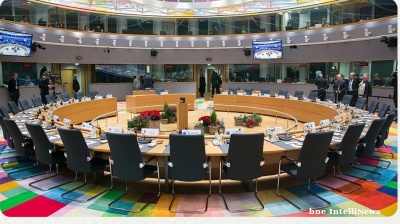Rosneft is opening new markets in Europe with its road construction product Alfabit
When it comes to the road-building business “made in Russia where it is really cold” turns out to be a boon.
Rosneft Deutschland GmbH, the Berlin-based subsidiary of Russia’s biggest oil company Rosneft, was set up three years ago to enter the European markets and start selling a broad range of products, including its innovative polymer-modified bitumen road building materials, branded “Alfabit”, and business is going very well.
Building roads is more complicated than you might think. Pounded by trucks and cars all year round, they also suffer wear and tear from the weather, being heated, frozen and rained on throughout the year. In countries like Russia the weather is so extreme and the temperature swings so large that the local engineers have become experts at building roads.
Rosneft’s Alfabit is a proprietary polymer-modified bitumen (PMB) that significantly improves the road surface so that it can cope with the heaviest of traffic, and enhances its durability so the wear and tear from extreme temperature changes does less damage and so the roads need less maintenance. And that leads to significant cost savings.
“Rosneft is the clear leader in PMBs as it can draw on its experience in Russia where the climate zones are very different and sometimes very intense,” noted company representatives, who spoke with bne IntelliNews via video call from Rosneft Deutschland’s headquarters in Berlin. “The product is not new but the recipe for the European market is unique.”
Fixing roads is a very big business indeed. Germany spent €7.6bn between 2016 and 2019 just on keeping its roads up to speed. Under Germany’s 2030 Federal Transport Infrastructure Plan, the government planned to invest €264bn in transport infrastructure between 2016 and 2030, and Germany will spend an estimated €8.7bn on roads between 2019 and 2022.
Without getting into the chemistry, a PMB product like Alfabit is created by adding special polymers in a “recipe,” as the industry experts call it, to the bitumen that remains the main element in the road construction product. The polymer adds various properties to the bitumen, improving the road in a number of ways, including: improved anti-rutting and anti-cracking properties; increased water- and low-temperature resistance; and increased durability that increases the road’s operational lifespan. Alfabit is supposed to meet all these goals and Rosneft Deutschland claims it makes one of the best products on the market.
Alfabit is used on several racing circuits thanks to its high-quality surface. The Formula One track in Russia’s Black Sea resort town of Sochi is coated with Alfabit.
“The situation in Sochi is a bit different. The aim is not to adapt to the weather but to produce a smooth thin surface that also has high adhesion that can withstand the extreme pressure of the high levels of acceleration and breaking of racing cars. A race track needs a very high quality surface,” they note in the company.
For the same reasons Alfabit has also been used on airport landing strips which work under very similar conditions to racing tracks and in Russia also face extreme weather conditions.
European business
Being present in many regions worldwide, Rosneft has cast its net wider, and opened the Rosneft Deutschland subsidiary in 2017. Rosneft Deutschland GmbH is now the third-largest petroleum refinery company in Germany, processing roughly 12.5mn tonnes of crude oil per year, and is both responsible for supplying refineries PCK, MiRO and Bayernoil with crude oil and for the distribution of petroleum products.
The Europe modified bitumen market is expected to grow by a compound average growth rate (CAGR) of 3.88% between 2018-2023 and Germany is the biggest part of this market, owing to the significant growth of construction and infrastructure planned.
The major factor driving the market is the increase in road construction and repair activities in Germany and across all of Europe, which makes up three quarters of all the infrastructure spending.
“We developed and have been using the Alfabit technology to build roads in Russia for 12 years already and the extremes of weather you can find there are far more intense than anything in Europe,” company representatives noted. “So when we go to customers in Europe they pay attention.”
The German customers were intrigued enough to take samples to test them and followed up with an industrial-scale test.
“Today we can claim the title of “reliable supplier” to German customers and the goal over the next years is to build up the business in [the] bitumen sector to become a major player.”
With the German customers on board, where the quality of road surfaces is especially important as it is the only country in Europe where there is no speed limit on some stretches of motorway, the German company has been adding new customers from the rest of Europe.
Rosneft Deutschland adapted the recipe for the German market and began supplying Alfabit to German consumers in 2018, shortly after the start of sales and marketing of bitumen in the country.
In 2019, Rosneft Deutschland increased sales of Alfabit by 37.5% year-on-year. The company also co-operates with Rosneft Bitumen, a Rosneft subsidiary, which produces a broad range of high quality bitumen products and mainly distributes in Russia.
“We have expanded in the last two years and sell to Poland, Austria, Czechia, France and also Benelux countries,” they said in Rosneft Deutschland. “The first deliveries to Switzerland were made earlier this year, and in the mid-term we want to become a major player in the business.”
Rosneft set up local production of bitumen in Germany, as it needs to be maintained at a certain temperature when transported and so can’t be carried over long distances. The company also established a supply chain for PMB in Germany using feedstock from the three refineries Rosneft has in Germany: PCK, Bayernoil, and MiRO. The business has grown steadily.
Switzerland opened
The latest addition to Rosneft’s customer base is Switzerland, to which products have been specially tailored because of its mountainous topography.
“Two grades were specially formulated to be used at construction areas with high road traffic intensity in Swiss highland and mountain areas, where anti-rutting, anti-cracking as well as waterproofing, and low-temperature resistance properties are highly required.”
The German and Swiss recipes have been developed in co-operation with German scientists and under the auspices of local regulations, which tightly control road building materials for obvious reasons, and will also be used on prominent roads.
“Swiss Alfabit grades ensure stronger traction between bitumen and aggregates, which better prevents water penetrating the road surface,” say the company representatives. “That is of special importance for road construction in regions with high precipitation and snow.”
If anything, the recipes of the product have already proved their ability in intense conditions. According to the company, Alfabit grades similar to those developed by Rosneft Deutschland are being used in construction projects for highways in the Ural Mountains belt region in Russia, with comparable terrain, climate and road intensity conditions to those found in Switzerland.
Features

Trump eyes Bagram return, with China in his sights
In the years it was operational, 14 nations operated at, or through Bagram. In addition to the US, these included UK forces and elements from France, Germany, South Korea and more.

$23bn windfall for Kazakhstan as Beijing shifts up a gear on New Silk Road
Resource-rich Central Asian country emerges as a standout destination for Chinese investment.

US cancels Chabahar port sanctions exemption in blow to India's regional strategy
US terminates Iran Chabahar port sanctions waiver from September 29, jeopardising India's strategic trade operations and regional connectivity initiatives through the key facility.

INTERVIEW: Moldova seizes its moment
From rapid progress towards EU accession to the reconstruction of neighbouring Ukraine, factors have aligned to make Moldova an attractive FDI destination, says Invest Moldova head Natalia Bejan.



